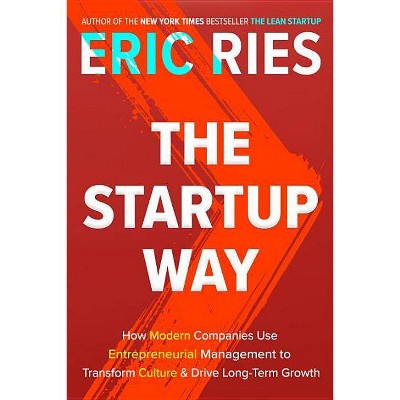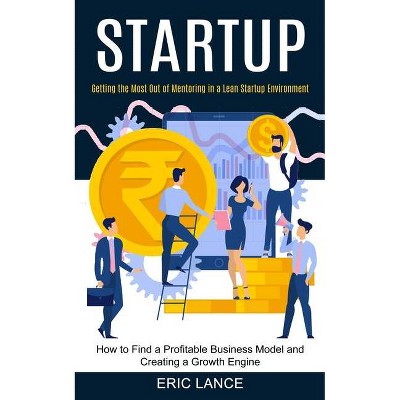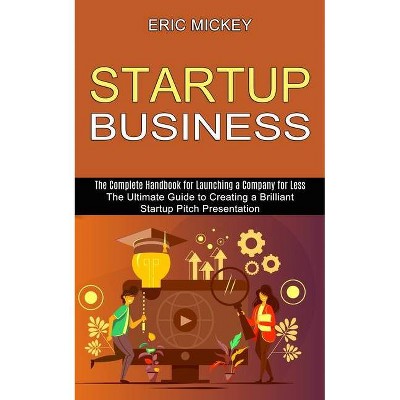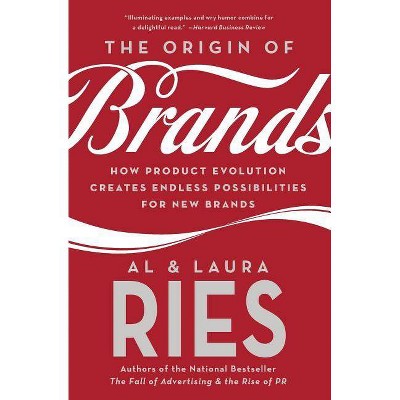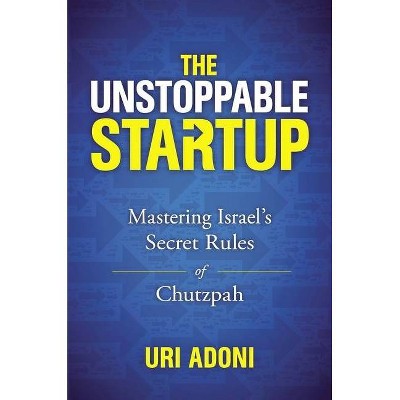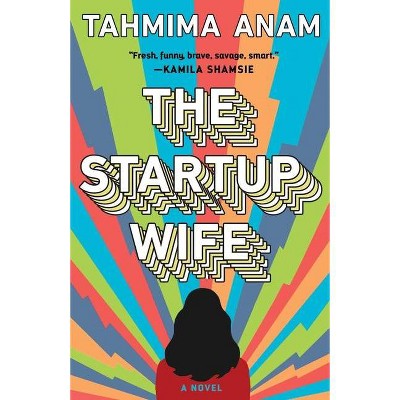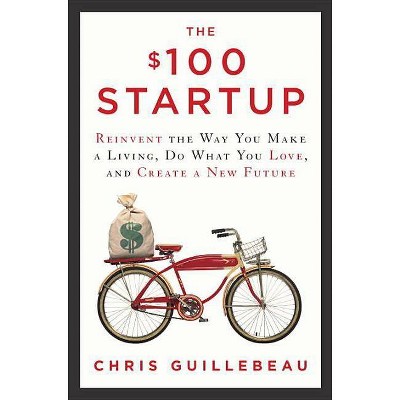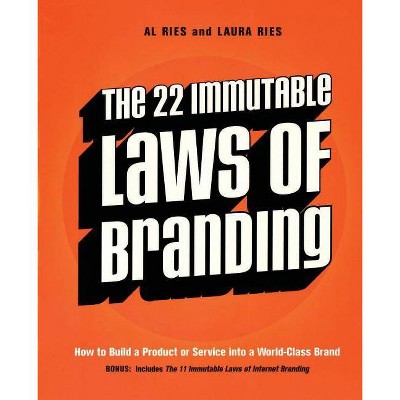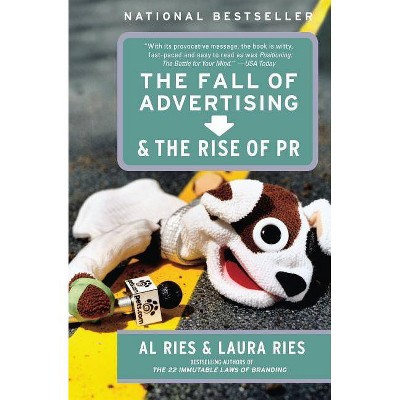The Lean Startup - by Eric Ries (Hardcover)
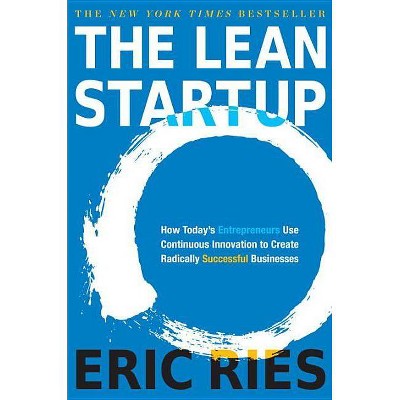
Similar Products
Products of same category from the store
AllProduct info
<p/><br></br><p><b> About the Book </b></p></br></br>"Most startups are built to fail. But those failures, according to entrepreneur Eric Ries, are preventable. Startups don't fail because of bad execution, or missed deadlines, or blown budgets. They fail because they are building something nobody wants. Whether they arise from someone's garage or are created within a mature Fortune 500 organization, new ventures, by definition, are designed to create new products or services under conditions of extreme uncertainly. Their primary mission is to find out what customers ultimately will buy. One of the central premises of The Lean Startup movement is what Ries calls "validated learning" about the customer. It is a way of getting continuous feedback from customers so that the company can shift directions or alter its plans inch by inch, minute by minute. Rather than creating an elaborate business plan and a product-centric approach, Lean Startup prizes testing your vision continuously with your customers and making constant adjustments"--<p/><br></br><p><b> Book Synopsis </b></p></br></br><p><b>Most startups fail. But many of those failures are preventable. <i>The Lean Startup </i>is a new approach being adopted across the globe, changing the way companies are built and new products are launched. <br></b><br>Eric Ries defines a startup as an organization dedicated to creating something new under conditions of extreme uncertainty. This is just as true for one person in a garage or a group of seasoned professionals in a Fortune 500 boardroom. What they have in common is a mission to penetrate that fog of uncertainty to discover a successful path to a sustainable business. <p/><i>The Lean Startup</i> approach fosters companies that are both more capital efficient and that leverage human creativity more effectively. Inspired by lessons from lean manufacturing, it relies on "validated learning," rapid scientific experimentation, as well as a number of counter-intuitive practices that shorten product development cycles, measure actual progress without resorting to vanity metrics, and learn what customers really want. It enables a company to shift directions with agility, altering plans inch by inch, minute by minute. <p/>Rather than wasting time creating elaborate business plans, <i>The Lean Startup</i> offers entrepreneurs--in companies of all sizes--a way to test their vision continuously, to adapt and adjust before it's too late. Ries provides a scientific approach to creating and managing successful startups in a age when companies need to innovate more than ever. <p/></p><p/><br></br><p><b> Review Quotes </b></p></br></br><br><p>The Lean Startup has a kind of inexorable logic, and Ries' recommendations come as a bracing slap in the face to would-be tech moguls: Test your ideas before you bet the bank on them. Don't listen to what focus groups say; watch what your customers do. Start with a modest offering and build on the aspects of it that prove valuable. Expect to get it wrong, and stay flexible (and solvent) enough to try again and again until you get it right. It's a message that rings true to grizzled startup vets who got burned in the Great Bubble and to young filmgoers who left The Social Network with visions of young Zuckerberg dancing in their heads. It resonates with Web entrepreneurs blessed with worldwide reach and open source code. It's the perfect philosophy for an era of limited resources, when the noun <i>optimism</i> is necessarily preceded by the adjective <i>cautious</i>. <b>--<i>Wired<br></i></b><br>"I make all our managers read <i>The Lean Startup</i>." <b>--Jeffery Immelt, CEO, General Electric</b></p><p>Eric has created a science where previously there was only art. A must read for every serious entrepreneur--and every manager interested in innovation. <br><b>--Marc Andreessen, co-founder of Andreessen Horowitz, Opsware Inc. and Netscape<br></b><br>"This book should be mandatory reading for entrepreneurs, and the same goes for managers who want better entrepreneurial instincts. Ries's book is loaded with fascinating stories--not to mention countless practical principles you'll dearly wish you'd known five years ago." <b>--Dan Heath, co-author of <i>Switch </i>and <i>Made to Stick<br></i></b><br>"Ries shows us how to cut through the fog of uncertainty that surrounds startups. His approach is rigorous; his prescriptions are practical and proven in the field. <i>The Lean Startup </i>will change the way we think about entrepreneurship. As startup success rates improve, it could do more to boost global economic growth than any management book written in years." <b>--Tom Eisenmann, Professor of Entrepreneurship, Harvard Business School</b><br><b> </b><br><i>"The Lean Startup</i> is the book whose lessons I want every entrepreneur to absorb and apply. I know of no better guide to improve the odds of a startup's success.<br><b>--Mitchell Kapor, Founder, Lotus Development Corp.</b><br><b><i> </i></b><br>At Asana, we've been lucky to benefit from Eric's advice firsthand; this book will enable him to help many more entrepreneurs answer the tough questions about their business.<br><b>--Dustin Moskovitz, co-founder of Facebook and Asana</b><br><b> </b><br>"Ries' splendid book is <i>the</i> essential template to understand <i>the</i> crucial leadership challenge of our time: initiating and managing growth!" <b>--Warren Bennis, Distinguished Professor of Business, University of Southern California and author of the recently published, <i>Still Surprised: A Memoir of a Life in Leadership.</i></b><br><b> </b><br><i>The Lean Startup</i> isn't just about how to create a more successful entrepreneurial business, it's about what we can learn from those businesses to improve virtually everything we do. I imagine Lean Startup principles applied to government programs, to healthcare, and to solving the world's great problems. It's ultimately an answer to the question 'How can we learn more quickly what works, and discard what doesn't?'<br><b>-- Tim O'Reilly, CEO O'Reilly Media</b> <p/>"Eric Ries unravels the mysteries of entrepreneurship and reveals that magic and genius are not the necessary ingredients for success but instead proposes a scientific process that can be learnt and replicated. Whether you are a startup entrepreneur or corporate entrepreneur there are important lessons here for you on your quest toward the new and unknown." <b>--Tim Brown, CEO of IDEO</b><br><b> </b><br>"The roadmap for innovation for the 21st century. The ideas in <i>The Lean Startup</i> will help create the next industrial revolution." <b>--Steve Blank, lecturer, Stanford University, U.C. Berkeley Haas Business School</b> <p/>The key lesson of this book is that start-ups happen in the present--that messy place between the past and the future where nothing happens according to PowerPoint. Ries's 'read and react' approach to this sport, his relentless focus on validated learning, the never-ending anxiety of hovering between 'persevere' and 'pivot', all bear witness to his appreciation for the dynamics of entrepreneurship. <b>--Geoffrey Moore, Author, <i>Crossing the Chasm</i></b><br><b><i> </i></b><br>If you are an entrepreneur, read this book. If you are thinking about becoming an entrepreneur, read this book. If you are just curious about entrepreneurship, read this book. Starting Lean is today's best practice for innovators. Do yourself a favor and read this book.<b> --Randy Komisar, founding director of TiVo and author of the bestselling <i>The Monk and the Riddle</i></b><br><b><i> </i></b><br>"How do you apply the 50 year old ideas of Lean to the fast-paced, high uncertainty world of Startups? This book provides a brilliant, well-documented, and practical answer. It is sure to become a management classic." <b>--Don Reinertsen, author of <i>The Principles of Product Development Flow</i></b><br><b><i> </i></b><br>"<i>The Lean Startup</i> is a foundational must-read for founders, enabling them to reduce product failures by bringing structure and science to what is usually informal and an art. It provides actionable ways to avoid product-learning mistakes, rigorously evaluate early signals from the market through validated learning, and decide whether to persevere or to pivot, all challenges that heighten the chance of entrepreneurial failure." <b>--Professor Noam Wasserman, Harvard Business School</b><br><b> </b><br>"One of the best and most insightful new books on entrepreneurship and management I've ever read. Should be required reading not only for the entrepreneurs that I work with, but for my friends and colleagues in various industries who have inevitably grappled with many of the challenges that <i>The Lean Startup</i> addresses." <b>--Eugene J. Huang, Partner, True North Venture Partners</b><br><b> </b><br>What would happen if businesses were built from the ground up to learn what their customers really wanted? <i>The Lean Startup</i> is the foundation for reimagining almost everything about how work works. Don't let the word startup in the title confuse you. This is a cookbook for entrepreneurs in organizations of all sizes. <b>--Roy Bahat, President, IGN Entertainment</b> <p/>"Every founding team should stop for 48 hours and read <i>Lean Startup</i>. Seriously stop and read this book now." <b>--Scott Case, CEO Startup America Partnership</b><br><b> </b><br>"In business, a 'lean' enterprise is sustainable efficiency in action. Eric Ries' revolutionary Lean Startup method will help bring your new business idea to an end result that is successful <i>and</i> sustainable. You'll find innovative steps and strategies for creating and managing your own startup while learning from the real-life successes and collapses of others. This book is a must read for entrepreneurs who are truly ready to start something great!" <b>--Ken Blanchard, coauthor of <i>The One Minute Manager(R) </i>and <i>The One Minute Entrepreneur <p/></i></b>"Every entrepreneur responsible for innovation within their organization should read this book. It entertainingly and meticulously develops a rigorous science for the innovation process through the methodology of "lean thinking". This methodology provides novel and powerful tools for companies to improve the speed and efficiency of their innovation processes through minimum viable products, validated learning, innovation accounting, and actionable metrics. These tools will help organizations large and small to sustain innovation by effectively leveraging the time, passion, and skill of their talent pools."<i> </i><b><i>--</i>Andrea Goldsmith, professor of Electrical Engineering at Stanford University, and cofounder of several startups<br></b><i> <br></i>"Business is too important to be left to luck. Eric reveals the rigorous process that trumps luck in the invention of new products and new businesses. We've made this a centerpiece of how teams work in my company . . . it works! This book is the guided tour of the key innovative practices used inside Google, Toyota, and Facebook, that work in any business." <b><i>--</i>Scott Cook, Founder and Chairman of the Executive Committee, Intuit<br></b></p><br><p/><br></br><p><b> About the Author </b></p></br></br><p><b>Eric Ries </b>is an entrepreneur and author of the popular blog Startup Lessons Learned. He co-founded and served as CTO of IMVU, his third startup, and has had plenty of startup failures along the way. He is a frequent speaker at business events, has advised a number of startups, large companies, and venture capital firms on business and product strategy, and is an Entrepreneur-in-Residence at Harvard Business School. His Lean Startup methodology has been written about in the <i>New York Times</i>, the <i>Wall Street Journal</i>, the <i>Harvard Business Review</i>, the <i>Huffington Post</i>, and many blogs. He lives in San Francisco.</p>
Price History
Price Archive shows prices from various stores, lets you see history and find the cheapest. There is no actual sale on the website. For all support, inquiry and suggestion messagescommunication@pricearchive.us
